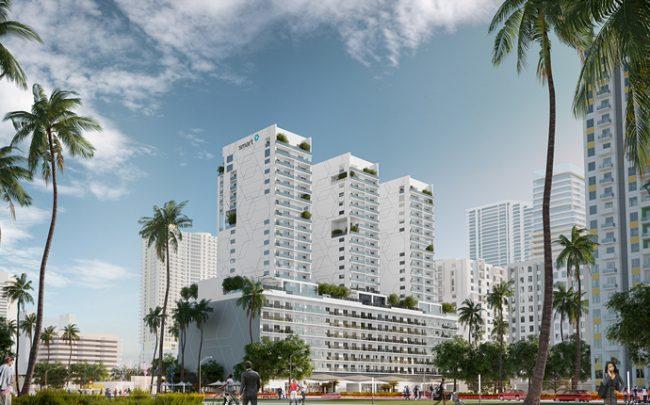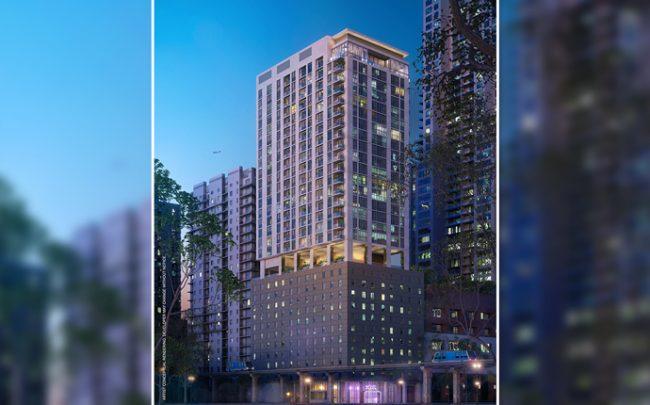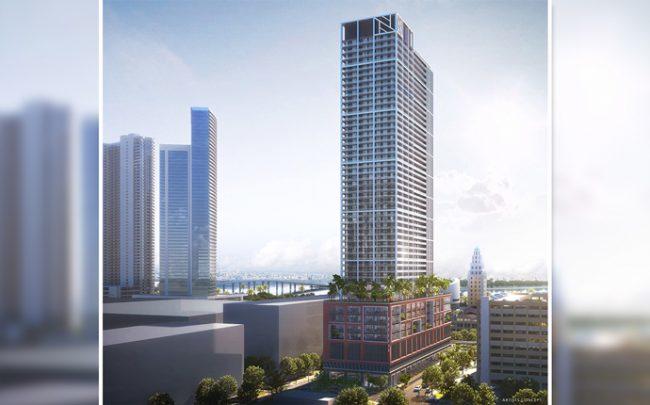It’s no secret that the Miami area is facing an oversupply of shiny new condos, spacious units with sprawling terraces in skyscrapers stretching from Brickell to the northernmost tip of Sunny Isles Beach.
But a new product type has emerged that developers claim they can’t build quickly enough: more affordable units that buyers can rent out however and whenever they want, no strings attached. The projects are mostly clustered in downtown Miami and Brickell, with price points in the $300,000 range and up – a sharp contrast to the glut of $1 million-and-up condos on the market in Miami.
Miami’s biggest condo developer is even getting in on the action. The Related Group is partnering with ROVR Development to build a roughly 400-foot tower with about 350 units in downtown Miami that will have a short-term rental or hotel component. The project is still in the design stages.

A rendering of Smart Brickell
Smart Brickell
Santiago Vanegas, founder of the Habitat Group, is one of the first developers to pivot with his planned project, Smart Brickell. In mid-2017, he launched sales of the first tower, with 50 hotel rooms and 50 condos. A year later, Habitat Group had sold out the first building and was beginning sales of the second tower, with the same number of hotel rooms and condos. A third tower will have 97 rental apartments.
Yet to be built, the project at 239 Southwest Ninth Street is now almost completely sold out.
“What the customer wants today is a combination between returns, flexibility, and price,” Vanegas said. Buyers at Smart Brickell will be able to rent their units out as often as 50 times a year on platforms such as Airbnb. They can also participate in a two-year, fixed annual leaseback program.
Construction on the first building will begin in October and will be completed in the fourth quarter of 2021, including the hotel. The second tower will be delivered and start operating as a hotel in the second quarter of 2022. Habitat Group is working with Ocean Bank and City National Bank to finance construction of the project, where units will range from about 600 square feet to 1,100 square feet. Cervera Real Estate is handling sales of the condos, priced from $300,000 to $600,000.
Investors, especially from Latin America, are attracted to Smart Brickell and similar projects because they provide income while the owners are away, as well as a place to stay when they are in town. And they don’t have to worry about short-term rental restrictions that may be found in older buildings – think pre-Airbnb – or in new luxury developments where end-users wouldn’t want to live among daily or weekly renters.
At Smart Brickell, the majority of buyers at Smart Brickell are from Latin America. “Those buyers are mainly investors and they plan to get a return,” Vanegas said. The two-year leaseback will offer rents of $3.50 per square foot, which Vanegas said is about 10 percent higher than the standard rental market.

YotelPad Miami
YotelPad
As early as 2015, developer David Arditi was working on plans for a mixed-use Yotel-branded hotel and residential tower in downtown Miami. Arditi’s Aria Development Group partnered with AQARAT, a Kuwaiti real estate company and an investor in Yotel, to develop the site.
The project, with 231 condos and 222 Yotel “cabins,” sold out this month, a year and a half after launching sales. The 31-story tower at 227 Northeast Second Street will have condos ranging from 417-square-foot studios to 708-square-foot two-bedrooms, with kitchen, dining and living areas.
OneWorld Properties is handling sales and marketing of YotelPad. More than half of its buyers hail from Mexico, China and Colombia. The building is expected to be completed in 2021.
“We had always explored some form of flexible rental policy or creative rental policy … We wanted to address a segment of the market that we think was not being addressed locally,” Arditi said. “South Florida continues to be reliant on non-local buyers – out of state, European, South American. A lot of these people use this as their second home, third home, an investment. It’s very logical.”
In other parts of the country, residents have already been willing to accept smaller units in exchange for building amenities, location and a more affordable price point.
“We took what we had seen in the markets in our projects in New York City and Washington, D.C. And in both of those markets there’s clearly a trend of prime locations with great amenities and a quality residential experience combined with smaller units,” Arditi said.
Whether it’s for-sale or rental units, Arditi said his focus has always been on the total purchase price or monthly rent while keeping functionality and livability in mind. With rising land and construction costs, the developers designed the building so that the unit prices are attainable for young buyers and are configured so that they fit more furnishings than people might expect.
“If you ask people if they can guess the square footage, they always think it’s [up to] 20 percent bigger,” Arditi said, adding that “the consumer doesn’t think in dollars per square foot.”
He plans to develop another site in downtown Miami into a similar project, and is considering building more YotelPads in South Florida, New York City, Los Angeles and Washington, D.C.

A rendering of Natiivo Miami
Natiivo Miami
While YotelPad and Smart Brickell have been in the works for years, a new competitor emerged this summer when developers Harvey Hernandez, Russell Galbut and Bruce Menin revealed plans for their first Airbnb hotel-condo project in South Florida.
Natiivo Miami, planned for 190 Northeast Sixth Street in downtown Miami, launched sales in June with a huge push to the broker community. Agents from a number of firms blasted their mailing lists with marketing materials for the development.
Natiivo is a new brand from Hernandez’s company, NGD Homesharing. Hernandez said the brand was “born out of necessity.” Three years ago, his company also created the Niido brand, a similar concept focused on the rental market.
“As we expanded the brand, we realized there was a space and need for a second brand that was more about hospitality,” Hernandez said. “Realtors felt there was a tremendous need for a licensed home-sharing [product].”
Natiivo is the first project in Miami that will be “powered by Airbnb,” which means that unit owners will be able to put individual rooms or entire units on the Airbnb platform. If the unit owners join Airbnb’s Friendly Buildings Program, hosts and NGD Homesharing would share the revenue generated from renting the units out on Airbnb.
Studios start at $330,000 and three-bedrooms go up to $1.2 million, according to one e-flier. The units, or rooms, will be able to be rented daily, with a management company handling everything from changing linens to washing the dishes, similar to a hotel.
Cervera Real Estate is handles sales of Natiivo. It’s expected to open in late 2022.
So far, Hernandez has two Niido projects in Miami-Dade. As for Natitvo, the downtown Miami project is the only one so far in Miami-Dade, but he said he is looking at a number of opportunities for the condo product in “every major city.”
“I think at the end of the day, ownership is changing,” Hernandez said. “If you don’t provide a very progressive way of ownership, you’re not going to be able to sell your product.”
